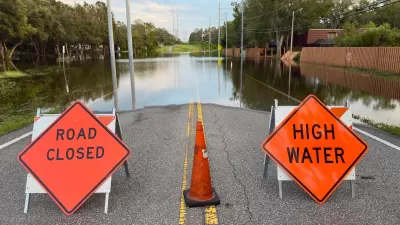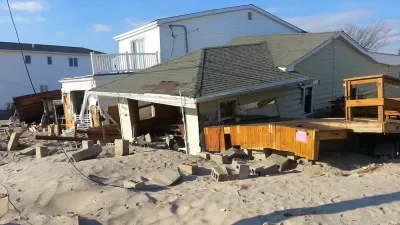Housing groups in Katrina-affected regions are expressing their outrage after a CNN investigation uncovered that tons of supplies intended for hurricane victims sat in storage for two years before being given away to cities and other organizations.
"FEMA gave away about $85 million in household goods meant for Hurricane Katrina victims, a CNN investigation has found. The material -- from basic kitchen goods to sleeping necessities -- sat in warehouses for two years before the Federal Emergency Management Agency's giveaway to federal and state agencies this year.
Martha Kegel, the head of a New Orleans nonprofit agency that helps find homes for those still displaced by the storm, said she was shocked to learn about the existence of the goods and the government giveaway.
'These are exactly the items that we are desperately seeking donations of right now -- basic kitchen household supplies,' said Kegel, executive director of Unity of Greater New Orleans. 'These are the very things that we are seeking right now. FEMA, in fact, refers homeless clients to us to house them. How can we house them if we don't have basic supplies?'
Kegel's group works with FEMA and other local organizations to rehouse victims of Katrina, the 2005 hurricane that flooded New Orleans and killed more than 1,800 people along the Gulf Coast. Community groups say thousands of people are still living in abandoned buildings in the city, though fewer than 100 people remain housed in tents.
FEMA confirmed it had kept the merchandise in storage for the past two years -- then gave it away to cities, schools, fire departments and nonprofit agencies such as food banks. In all, General Services Administration records show FEMA gave away 121 truckloads of material."
FULL STORY: FEMA gives away $85 million of supplies for Katrina victims

Trump Administration Could Effectively End Housing Voucher Program
Federal officials are eyeing major cuts to the Section 8 program that helps millions of low-income households pay rent.

Planetizen Federal Action Tracker
A weekly monitor of how Trump’s orders and actions are impacting planners and planning in America.

The 120 Year Old Tiny Home Villages That Sheltered San Francisco’s Earthquake Refugees
More than a century ago, San Francisco mobilized to house thousands of residents displaced by the 1906 earthquake. Could their strategy offer a model for the present?

HSR Reaches Key Settlement in Northern California City
The state’s high-speed rail authority reached an agreement with Millbrae, a key city on the train’s proposed route to San Francisco.

Washington State Legislature Passes Parking Reform Bill
A bill that would limit parking requirements for new developments is headed to the governor’s desk.

Missouri Law Would Ban Protections for Housing Voucher Users
A state law seeks to overturn source-of-income discrimination bans passed by several Missouri cities.
Urban Design for Planners 1: Software Tools
This six-course series explores essential urban design concepts using open source software and equips planners with the tools they need to participate fully in the urban design process.
Planning for Universal Design
Learn the tools for implementing Universal Design in planning regulations.
Ada County Highway District
Clanton & Associates, Inc.
Jessamine County Fiscal Court
Institute for Housing and Urban Development Studies (IHS)
City of Grandview
Harvard GSD Executive Education
Toledo-Lucas County Plan Commissions
Salt Lake City
NYU Wagner Graduate School of Public Service





























